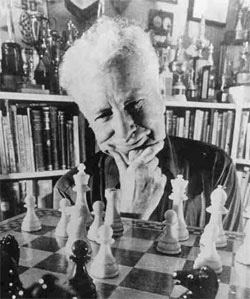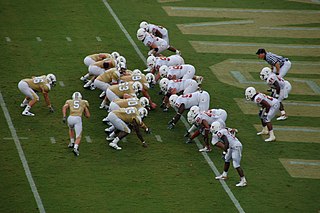
The Elo rating system is a method for calculating the relative skill levels of players in zero-sum games such as chess. It is named after its creator Arpad Elo, a Hungarian-American physics professor.
A tournament is a competition involving at least three competitors, all participating in a sport or game. More specifically, the term may be used in either of two overlapping senses:
- One or more competitions held at a single venue and concentrated into a relatively short time interval.
- A competition involving a number of matches, each involving a subset of the competitors, with the overall tournament winner determined based on the combined results of these individual matches. These are common in those sports and games where each match must involve a small number of competitors: often precisely two, as in most team sports, racket sports and combat sports, many card games and board games, and many forms of competitive debating. Such tournaments allow large numbers to compete against each other in spite of the restriction on numbers in a single match.
Passer rating is a measure of the performance of passers, primarily quarterbacks, in gridiron football. There are two formulas currently in use: one used by both the National Football League (NFL) and Canadian Football League (CFL), and the other used in NCAA football. Passer rating is calculated using a player's passing attempts, completions, yards, touchdowns, and interceptions. Passer rating in the NFL is on a scale from 0 to 158.3. Passing efficiency in college football is on a scale from −731.6 to 1261.6.
Jeff Sagarin is an American sports statistician known for his development of a method for ranking and rating sports teams in a variety of sports. His ratings have been a regular feature in the USA Today sports section since 1985, have been used by the NCAA Tournament Selection Committee to help determine the participants in the NCAA Men's Division I Basketball Championship tournament since 1984, and were part of the college football Bowl Championship Series throughout its history from 1998 to 2014.
A Swiss-system tournament is a non-eliminating tournament format that features a fixed number of rounds of competition, but considerably fewer than for a round-robin tournament; thus each competitor does not play all the other competitors. Competitors meet one-on-one in each round and are paired using a set of rules designed to ensure that each competitor plays opponents with a similar running score, but does not play the same opponent more than once. The winner is the competitor with the highest aggregate points earned in all rounds. All competitors play in each round unless there is an odd number of them.

Bid whist is a partnership trick-taking variant of the classic card game whist. As indicated by the name, bid whist adds a bidding element to the game that is not present in classic whist. Bid whist, along with spades, remains popular particularly in U.S. military culture and a tradition in African-American culture.
In European football, the UEFA coefficients are statistics used for ranking and seeding teams in club and international competitions. Introduced in 1979 for men's football tournaments, and after applied in women's football and futsal, the coefficients are calculated by UEFA, who administer football within Europe.

A sports rating system is a system that analyzes the results of sports competitions to provide ratings for each team or player. Common systems include polls of expert voters, crowdsourcing non-expert voters, betting markets, and computer systems. Ratings, or power ratings, are numerical representations of competitive strength, often directly comparable so that the game outcome between any two teams can be predicted. Rankings, or power rankings, can be directly provided, or can be derived by sorting each team's ratings and assigning an ordinal rank to each team, so that the highest rated team earns the #1 rank. Rating systems provide an alternative to traditional sports standings which are based on win-loss-tie ratios.
Mid-major is a term used in American NCAA Division I college sports, especially men's basketball, to refer to athletic conferences that are not among the so-called "Power Five conferences". These conferences are sometimes referred to as "high majors" by comparison. The term "mid-major" was coined in 1977 by Jack Kvancz, head coach of Catholic University's men's basketball team. Such a distinction is not officially acknowledged by the NCAA, nor does the NCAA use the terms "major" and "mid-major" to differentiate between Division I athletic conferences. It is considered offensive and derogatory by some fans and schools.

The NIFL Premiership, known as the Danske Bank Premiership for sponsorship purposes, and colloquially as the Irish League or Irish Premiership, is a professional association football league which operates as the highest division of the Northern Ireland Football League – the national league in Northern Ireland. The Premiership was established as the IFA Premiership in 2008 under the auspices of the Irish Football Association, before the Northern Ireland Football League was created for the start of the 2013–14 season. At the end of the season, the champion club is presented with the Gibson Cup.
The World Rugby Rankings is a ranking system for men's national teams in rugby union, managed by World Rugby, the sport's governing body. The teams of World Rugby's member nations are ranked based on their game results, with the most successful teams being ranked highest. A point system is used, with points being awarded on the basis of the results of World Rugby-recognized international matches. Rankings are based on the team's performance, with more recent results and more significant matches being more heavily weighted to help reflect the current competitive state of a team. The ranking system was introduced the month before the 2003 Rugby World Cup, with the first new rankings issued on 8 September 2003. World Rugby now also publishes rankings for women's teams.

Kenneth Massey is an American sports statistician known for his development of a methodology for ranking and rating sports teams in a variety of sports. His ratings have been a part of the Bowl Championship Series since the 1999 season. He is an assistant professor of mathematics at Carson–Newman University in Tennessee.
The FIFA men's ranking system 1999–2006 is a calculation technique previously used by FIFA for ranking men's national teams in football (soccer). The ranking system was introduced by FIFA in 1999, as an update to an earlier system, and was replaced after the 2006 World Cup with a simplified system.
In American college football, the 2006 BCS computer rankings are a part of the Bowl Championship Series (BCS) formula that determines who plays in the BCS National Championship Game as well as several other bowl games. Each computer system was developed using different methods which attempts to rank the teams' performance. For 2006, the highest and lowest rankings for a team are dropped and the remaining four rankings are summed. A team ranked #1 by a computer system is given 25 points, #2 is given 24 points and so forth. The summed values are then divided by 100. The values are then ranked by percentage. This percentage ranking is then averaged with the Coaches Poll and Harris Poll average rankings, each receiving equal weight, and the results become the BCS Rankings.
In American college football, the 2007 BCS computer rankings are a part of the Bowl Championship Series (BCS) formula that determines who plays in the BCS National Championship Game as well as several other bowl games. Each computer system was developed using different methods which attempts to rank the teams' performance. For 2007, the highest and lowest rankings for a team are dropped and the remaining four rankings are summed. A team ranked #1 by a computer system is given 25 points, #2 is given 24 points and so forth. The summed values are then divided by 100. The values are then ranked by percentage. This percentage ranking is then averaged with the Coaches Poll and Harris Poll average rankings, each receiving equal weight, and the results become the BCS Rankings.
The IRL World Rankings are the ranking system for men's national teams in the sport of rugby league football. The teams of the member nations of the International Rugby League, rugby league football's world governing body, are ranked based on their game results with the most successful teams being ranked highest. A point system is used, with points being awarded based on the results of IRL-recognized international matches. Under the existing system, rankings are based on a team's performance over the last three years, with more recent results and more significant matches being more heavily weighted to help reflect the current competitive state of a team.

The College Football Playoff (CFP) is an annual postseason knockout invitational tournament to determine a national champion for the National Collegiate Athletic Association (NCAA) Division I Football Bowl Subdivision (FBS), the highest level of college football competition in the United States. Four teams play in two semifinal games, and the winner of each semifinal advances to the College Football Playoff National Championship game.

The Drexel Dragons men's lacrosse team represents Drexel University in National Collegiate Athletic Association (NCAA) Division I men's lacrosse. Drexel currently competes as a member of the Colonial Athletic Association (CAA) and plays its home games at Vidas Field in Philadelphia, Pennsylvania. Drexel made its first NCAA tournament appearance in 2014.
The FIFA men's ranking system 2006–2018 was a calculation technique previously used by FIFA for ranking men's national teams in football. The ranking system was introduced by FIFA after the 2006 FIFA World Cup, as an update to an earlier system, and was replaced after the 2018 World Cup with a revised Elo-based system.
The World Football Elo Ratings are a ranking system for men's national association football teams that is published by the website eloratings.net. It is based on the Elo rating system but includes modifications to take various football-specific variables into account, like the margin of victory, importance of a match, and home field advantage. Other implementations of the Elo rating system are possible and there is no single nor any official Elo ranking for football teams.






